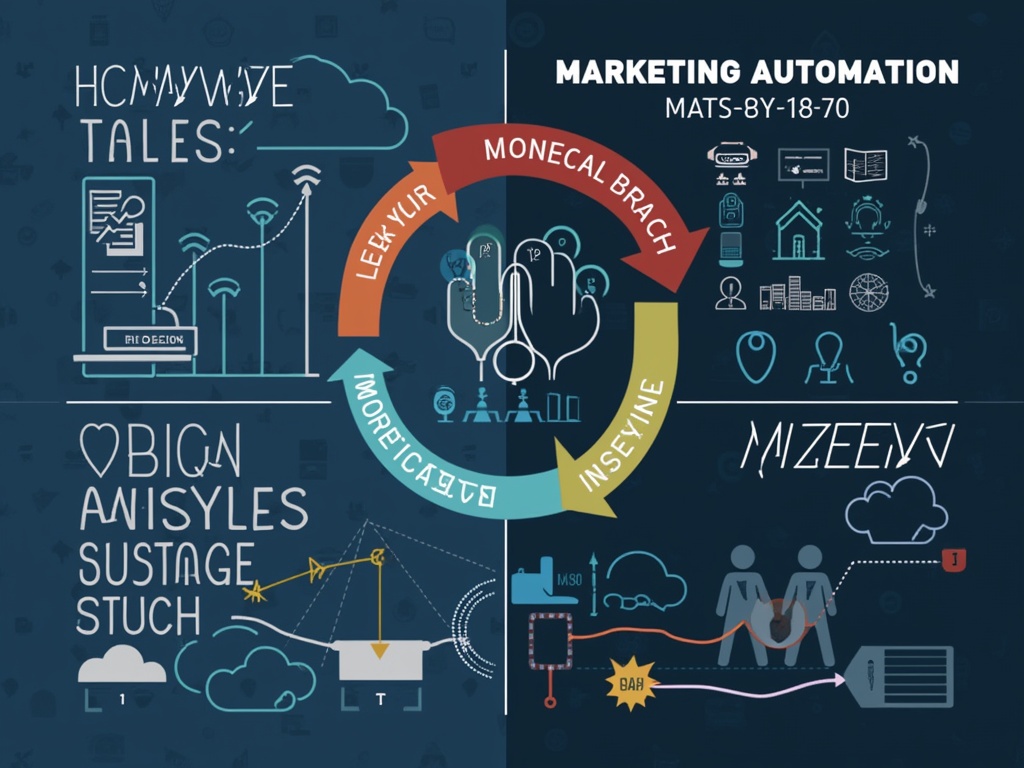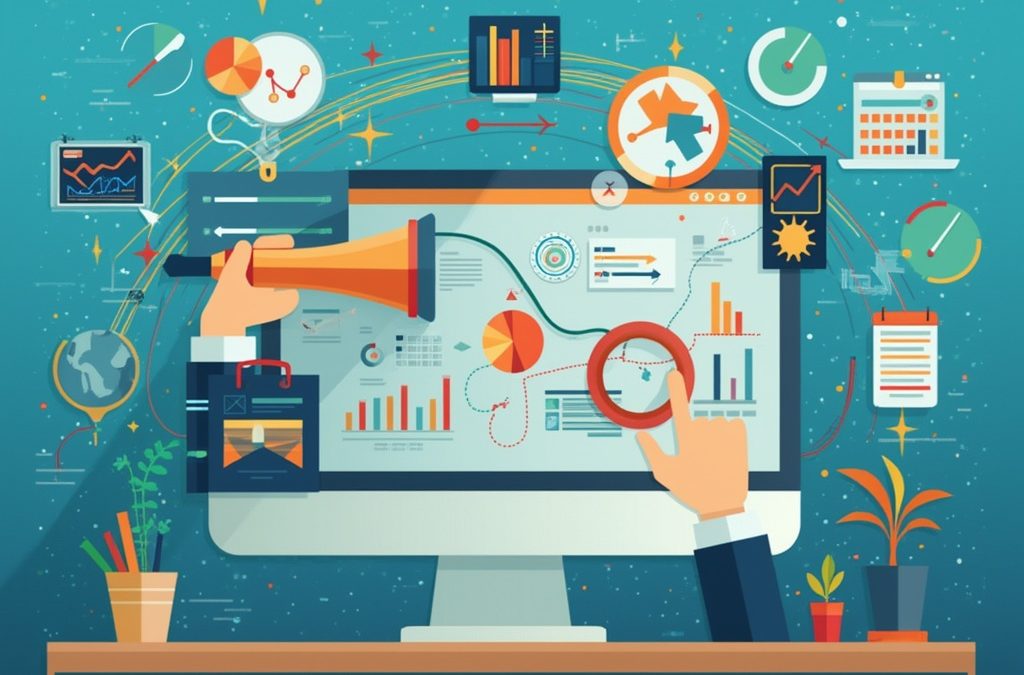Marketing automation has revolutionized how professional services firms engage with clients and prospects. By leveraging intelligent software systems, these organizations can streamline their marketing efforts, personalize communications, and drive more efficient lead generation and nurturing processes.
Key Takeaways:
- Marketing automation enhances efficiency and productivity for professional services firms
- Personalized client interactions are made possible through data-driven insights
- Automation tools enable consistent brand messaging across multiple channels
- Lead scoring and nurturing become more targeted and effective with automation
- Analytics and reporting features provide valuable insights for strategy refinement
Understanding Marketing Automation for Professional Services
Marketing automation is a game-changer for professional services firms looking to boost their marketing effectiveness. It’s about using software to automate repetitive marketing tasks, freeing up time for strategizing and high-value activities. For professional services, this means more efficient lead generation, nurturing, and client relationship management.
The beauty of marketing automation lies in its ability to personalize communications at scale. By leveraging client data and behavior patterns, firms can deliver targeted messages that resonate with each recipient. This level of personalization was once impossible to achieve manually, especially for firms with large client bases.

Key Benefits of Marketing Automation
The advantages of implementing marketing automation in professional services are numerous. Here are some of the most significant benefits:
- Increased efficiency and productivity
- Improved lead quality and conversion rates
- Enhanced client engagement and retention
- More accurate tracking and reporting of marketing efforts
- Better alignment between marketing and sales teams
By automating routine tasks, marketing teams can focus on strategic initiatives and creative problem-solving. This shift in focus can lead to more innovative marketing approaches and better overall results for the firm.
Implementing Marketing Automation: Best Practices
To get the most out of marketing automation, professional services firms should follow these best practices:
1. Start with a clear strategy: Before implementing any automation tools, define your goals and how automation will help achieve them.
2. Choose the right platform: Select a marketing automation platform that integrates well with your existing systems and meets your specific needs.
3. Clean and organize your data: Ensure your client and prospect data is accurate and well-structured to enable effective segmentation and personalization.
4. Create valuable content: Develop high-quality content that addresses your audience’s pain points and interests to fuel your automated campaigns.
5. Test and optimize continuously: Regularly analyze your automated campaigns’ performance and make data-driven improvements.
By following these practices, firms can establish a solid foundation for their marketing automation efforts, setting the stage for improved results and client satisfaction.
Overcoming Challenges in Marketing Automation
While the benefits of marketing automation are clear, implementing it successfully can present challenges. Some common hurdles include:
- Resistance to change from team members
- Integration issues with existing systems
- Overreliance on automation at the expense of personal touch
- Difficulty in creating relevant, personalized content at scale
To overcome these challenges, it’s crucial to invest in training and change management. Ensure your team understands the value of automation and how to use it effectively. Additionally, maintain a balance between automated processes and personal interactions to preserve the human element that’s so important in professional services.
The Future of Marketing Automation in Professional Services
As technology continues to advance, the possibilities for marketing automation in professional services are expanding. AI and machine learning are enhancing the capabilities of automation platforms, enabling even more sophisticated personalization and predictive analytics.
Looking ahead, we can expect to see:
- More advanced AI-driven content creation and optimization
- Enhanced integration with voice and chatbot technologies
- Greater use of predictive analytics for client behavior forecasting
- Increased focus on privacy and data protection in automated systems
By staying ahead of these trends, professional services firms can position themselves for scalable growth and improved client relationships. The key is to remain adaptable and continuously seek ways to leverage automation for better client experiences and business outcomes.
Sources:
Frequently Asked Questions
What is Marketing Automation and How Does it Benefit Professional Services Firms?
Marketing automation is the use of software systems to automate repetitive marketing tasks, such as email marketing, lead nurturing, and social media management. For professional services firms, it enhances efficiency and productivity by freeing up time for strategic initiatives and creative problem-solving. It also enables personalized client interactions, consistent brand messaging, and more effective lead generation and nurturing processes.
How Can Marketing Automation Improve Client Engagement and Retention?
Marketing automation allows firms to personalize communications at scale by leveraging client data and behavior patterns. This personalization helps deliver targeted messages that resonate with each recipient, leading to enhanced client engagement and retention. Additionally, automation tools enable consistent brand messaging across multiple channels, ensuring a cohesive and engaging experience for clients.
What Are the Key Steps to Implementing Marketing Automation Successfully?
To implement marketing automation successfully, start with a clear strategy that defines your goals and how automation will help achieve them. Choose a marketing automation platform that integrates well with your existing systems and meets your specific needs. Ensure your client and prospect data is accurate and well-structured to enable effective segmentation and personalization. Develop high-quality content that addresses your audience’s pain points and interests, and regularly test and optimize your automated campaigns based on performance data.
What Are Some Common Challenges in Implementing Marketing Automation, and How Can They Be Overcome?
Common challenges include resistance to change from team members, integration issues with existing systems, overreliance on automation at the expense of personal touch, and difficulty in creating relevant, personalized content at scale. To overcome these challenges, invest in training and change management to ensure your team understands the value of automation and how to use it effectively. Maintain a balance between automated processes and personal interactions to preserve the human element important in professional services.
How Will Advances in Technology Impact the Future of Marketing Automation in Professional Services?
Advances in technology, such as AI and machine learning, are enhancing the capabilities of marketing automation platforms. In the future, we can expect more advanced AI-driven content creation and optimization, enhanced integration with voice and chatbot technologies, greater use of predictive analytics for client behavior forecasting, and an increased focus on privacy and data protection in automated systems. By staying ahead of these trends, professional services firms can position themselves for scalable growth and improved client relationships.
People Also Ask
What are the key benefits of marketing automation for professional services firms?
Marketing automation offers several key benefits for professional services firms, including:
- Increased Efficiency and Productivity: By automating repetitive marketing tasks, firms can free up time for their teams to focus on strategic initiatives and high-value activities. This leads to higher productivity and efficiency in managing client relationships and marketing efforts[1][4].
- Improved Lead Quality and Conversion Rates: Automation tools enable firms to implement lead scoring and nurturing processes that are more targeted and effective. This results in higher quality leads and better conversion rates[1][4].
- Enhanced Client Engagement and Retention: Marketing automation allows for personalized communications at scale, using client data and behavior patterns to deliver targeted messages that resonate with each recipient. This enhances client engagement and retention[1][4].
How can professional services firms implement marketing automation effectively?
To implement marketing automation effectively, professional services firms should follow these best practices:
- Start with a Clear Strategy: Define your goals and how automation will help achieve them. This ensures alignment between your marketing automation efforts and your overall business objectives[1].
- Choose the Right Platform: Select a marketing automation platform that integrates well with your existing systems and meets your specific needs. This could include integration with your CRM system to centralize client data and track interactions[1][4].
- Clean and Organize Your Data: Ensure your client and prospect data is accurate and well-structured to enable effective segmentation and personalization. Clean data is crucial for the success of your automated campaigns[1].
- Test and Optimize Continuously: Regularly analyze your automated campaigns’ performance and make data-driven improvements. This helps in refining your marketing approach and maximizing ROI[1].
What are some common challenges in implementing marketing automation, and how can they be overcome?
Implementing marketing automation can present several challenges, including:
- Resistance to Change: Team members may resist adopting new automation tools. To overcome this, invest in training and change management to ensure your team understands the value of automation and how to use it effectively[1].
- Integration Issues: Ensure that the marketing automation platform integrates seamlessly with your existing systems to avoid technical hurdles. Choosing a platform that is compatible with your CRM and other tools is essential[1][4].
- Overreliance on Automation: Maintain a balance between automated processes and personal interactions to preserve the human element that is crucial in professional services. This ensures that clients receive a personalized and engaging experience[1].
How does marketing automation enhance the alignment between marketing and sales teams in professional services firms?
Marketing automation enhances the alignment between marketing and sales teams in several ways:
- Centralized Data: By integrating the marketing automation platform with the CRM system, all lead and customer data is centralized and accessible to both teams. This ensures that both marketing and sales teams have a comprehensive view of client interactions and history[1][4].
- Shared Processes: Automation helps in developing shared processes and workflows for lead qualification, nurturing, and handoff. This streamlines the sales process and ensures that leads are nurtured efficiently and converted effectively[1].
- Data-Driven Insights: Marketing automation provides reports and insights that help both teams track their progress and make data-driven decisions. This fosters collaboration and ensures everyone is working towards the same goals[1].
What role does AI and machine learning play in the future of marketing automation for professional services?
AI and machine learning are significantly enhancing the capabilities of marketing automation platforms for professional services. Here are some key trends:
- Advanced Content Creation and Optimization: AI can create and optimize content more effectively, ensuring that it resonates with the target audience. This includes personalized emails, social media posts, and other marketing materials[1].
- Predictive Analytics: AI-driven predictive analytics can forecast client behavior, allowing firms to anticipate and meet client needs more effectively. This enhances client engagement and retention[1].
- Integration with Voice and Chatbot Technologies: Future marketing automation will see greater integration with voice and chatbot technologies, providing clients with more interactive and personalized experiences[1].

